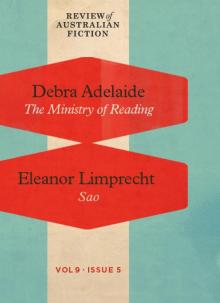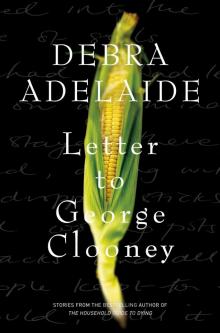- Home
- Debra Adelaide
The Women's Pages
The Women's Pages Read online
About The Women’s Pages
‘Emily Brontë had written this novel especially for her. For her benefit she had sat alone in her narrow bed in the parsonage, her lap desk on her knees, death all around her with that graveyard right next door, the cold wind from the moors behind rattling the windows . . . But who had Dove written her story for?’
Dove is writing a novel for herself, for her mother and for their literary heroines. It describes the life of Ellis, an ordinary young woman of the 1960s troubled by secrets and gaps in her past.
Having read Wuthering Heights to her dying mother, Dove finds she cannot shake off the influence of that singular novel: it has infected her like a disease. In grief’s aftermath, she follows the story Wuthering Heights has inspired to discover more about Ellis, who has emerged from the pages of fiction herself – or has she? – to become a modern successful career woman.
The Women’s Pages is about the choices and compromises women make, about their griefs and losses, and about the cold aching spaces that are left when they disappear from the story. It explores the mysterious process of creativity, and the way stories are shaped and fiction is formed. Right up to its astonishing conclusion, The Women’s Pages asserts the power of the reader’s imagination, which can make the deepest desires and strangest dreams come true.
Contents
Cover
About The Women’s Pages
Dedication
Epigraph
Chapter One
Chapter Two
Chapter Three
Chapter Four
Chapter Five
Chapter Six
Chapter Seven
Chapter Eight
Chapter Nine
Chapter Ten
Chapter Eleven
Chapter Twelve
Chapter Thirteen
Chapter Fourteen
Chapter Fifteen
Chapter Sixteen
Chapter Seventeen
Chapter Eighteen
Chapter Nineteen
Chapter Twenty
Chapter Twenty-one
Chapter Twenty-two
Chapter Twenty-three
Chapter Twenty-four
Chapter Twenty-five
Chapter Twenty-six
Chapter Twenty-seven
Chapter Twenty-eight
Chapter Twenty-nine
Chapter Thirty
Chapter Thirty-one
Chapter Thirty-two
Chapter Thirty-three
Chapter Thirty-four
Chapter Thirty-five
Author’s Note
About Debra Adelaide
Also by Debra Adelaide
Copyright page
for my daughter
‘That capacity for intense attachments
reminded me of her mother:
still she did not resemble her:
for she could be soft and mild as a dove . . .’
Emily Brontë, Wuthering Heights
1
When Betty Denman invited Ellis to the barbecue party, they were standing outside the greengrocer’s in the early afternoon sun. Its blue canvas awning flapped uselessly against the heat and Ellis was keen to get home, having already been caught up discussing with Gino ways of cooking spinach and why she had never used garlic. And now Betty wanted to chat. She went out every day, making long excursions of activities that other women accomplished in one hit. Ellis imagined her going home after her daily visits to the shops and the post office, to her Wednesday Ladies’ Auxiliary meetings and her Friday tennis, always to an empty house until Mack returned from work, at five-forty on the dot. On Saturdays they normally went to the RSL, and on Sundays Betty went to church while Mack played golf.
‘Would you mind?’ Betty said, adding, ‘Your asparagus rolls are almost famous!’ as if asking might have been a mild offence.
‘Of course not,’ Ellis said. She would have offered anyway since she found cooking easy and Betty didn’t.
‘This Saturday,’ Betty repeated. ‘Six o’clock. It’s for our tenth wedding anniversary.’
She went on to explain that Mack was getting a keg and borrowing the club’s punchbowl and cups. And he would be taking the television out the back to set up in his shed, so the men could watch the cricket. Betty didn’t seem to notice Ellis checking the baby in the pram, even though he was quiet, and looking up at the hot sky. And she didn’t explain why the party seemed to be such a last-minute idea. Ellis briefly wondered at the prospect of Mack organising a party for his and Betty’s tenth anniversary. A keg. The club punchbowl. She hadn’t heard of a man doing that before.
Finally Ellis checked her wristwatch. ‘Betty, I’ve got to go.’
There was enough time for her to walk home the long way via the corner grocer and finish the shopping and not have to go to the shops again before the weekend. She could get some tins of white asparagus and ask Vince to go out for two fresh loaves first thing Saturday before he left for work, as the baker didn’t deliver on the weekend.
Her asparagus rolls were almost famous. The secret was using sour cream instead of butter, and forming extra thin slices of bread by first cutting into the loaf from each of the four sides, only as far as the breadknife would go, then severing through the final middle portion. You could get wafer-thin slices that way. Along with the finely ground black pepper, and the sour cream spread that Ellis made herself, this technique made all the difference, though none of the other women could ever work out why. Hardly anyone thought to use black pepper, and as far as Ellis could tell no one but she used sour cream much. It was the sort of thing women tended to buy when they made beef stroganoff, but she generally kept a carton in the fridge and used it in all sorts of dishes.
By the time she got home the air in the flat, which trapped the afternoon sun, had become thick with heat. She took the baby out of his pram and into his room. Charlie was damp but still drowsy so she put him straight into his cot without changing his nappy, switching on the corner fan and covering him with a sheet.
In the kitchen she opened the window over the sink and pulled the blind halfway down, then took out the potatoes, half a savoy cabbage and beans from the string bag she had hung over the handles of the pram. She put the meat and sour cream in the fridge and smoothed out the sheets of newspaper the greengrocer had wrapped the cabbage in and stored them in the box beneath the sink to use later for lining the bin. The cabbage had received a faint imprint of news ink on its cut side. Gino always used the Daily Telegraph, but she wished he would not wrap cut vegetables in the front page, as its larger type was so much more inky. She could see a trace in reverse of the headlines about the referendum on the casino in Tasmania. She looked at the cabbage for a while, considering whether to wash it or shave the spoiled side off, but left it on the draining board instead. Vince loved savoy cabbage lightly boiled and smothered in butter, though she resisted cooking it at all, if possible: ever since boarding school the smell had repelled her. Gino had offered her a vegetable he called an eggplant, which he said his father grew in their backyard. He had told her it tasted like oily heaven and she was intrigued, cupping the glossy purple globe in her hand, especially when he said his family cooked it in a vegetable casserole dish called caponata. She repeated it, cap-on-a-ta, a lovely new word which sounded like a musical term. And a vegetable casserole, something even newer. But she knew Vince would not like it.
Finally, she placed the tins of asparagus in the cupboard, closed the door, and rested her forehead against it, staring at the laminex bench below for a long time. A ten-year anniversar
y. The laminex, pale green, was worn in places but not likely to be replaced as she and Vince were only renting. She rubbed at some whorls of scratches inflicted by a previous tenant. She could not imagine ten years of marriage. When she had accepted Vince she had known it was not for love but had believed it was the right thing for her to do. However, ever since the baby had arrived the great injustice of what she had done rose like a tide of bile up her throat. Some days it was as if she had literally to swallow down on the bitterness of how fraudulent she felt. Miserable, too, as she knew Vince deserved better. Ten years. She could not foresee another eight years like this.
Had there not been a sudden wail from the baby’s room she might have cried herself. She listened to Charlie’s sobs for a minute before breathing in deeply and turning around. Her son was only six months old and she had no right to present him with the cold truth stamped all over her face. In his room, smiling, she reached out for him, kissing his teary face quiet. She tucked him close into her neck, cradling his now sodden bottom in her other hand.
‘It’s going to be tough, little one,’ she whispered as she laid him down and prepared to undress him for his bath.
2
It was reading that had brought Dove to this. Reading that novel when she was a teenager, or whenever it was she had first read it, then again as a young woman, when she had underlined great slabs of the text in ink, for some reason she could not now remember, and then yet again to her mother as she lay in hospital dying – reading it had infected her imagination. It was like a malaria of the brain, lying dormant then leaping up at unexpected times to attack with the fever of unresolved narrative. And it would not depart until she had grappled with the confusion of gaps and shadowy images and half-truths – ones that were far more dominant and demanding than the scenes and the characters that she also saw with perfect, often frightening, clarity.
The novel had unfolded again and again to be something different every time, and she was sick of it because it meant there would never be a final reading of this book for her. Like that mosquito-borne tropical fever, it would never let her go. She had half a lifetime ahead of her, she was not yet forty, and this novel was going to torture her for the rest of her life. She would be close to death and it would still have its hooks into her. Doubtless even after death when she was good and buried with the soft wind breathing through the grass above her, not for her would there be peace. She would never be one of the sleepers in the quiet earth.
Nevertheless Dove bought the copy of Wuthering Heights that afternoon. It was impossible not to even though she already had several copies at home. She had gone into town to buy a new coffee machine and ended up in Dymocks where the stand of Penguin Classics lured – no, taunted – her. And on the bus going home she re-read the first three chapters. By the time she got off and walked down the street and into her house, she felt as exhausted and benumbed as Lockwood, feeble as a kitten and wishing she had her own housekeeper to bring in supper and sit down with her while she ate it, and either animate or lull her to sleep with her talk.
Her mother had been a violin teacher, and when she was lying peaceful and close to death in hospital Dove had suggested some music, thinking she could bring in her iPod and feed it straight into her ears. But Jane had requested, murmuring, that she bring in Wuthering Heights and read it to her instead. And she wanted the old copy from her flat. When Dove found it she saw that it was stamped on the inside cover with the name of the girls’ school past Bathurst where her mother had taught music nearly forty years ago, before she was born. Perhaps she had taught English as well, since the copy contained tiny slips with notes and pencilled annotations in the margins – her mother’s discreet hand was nothing like her own bold underlinings and exclamation marks. A novel without a reader? went one neat comment on the half-title page. Another noted, Imptc of narrative perspective. Self-conscious literary artefact. On the facsimile reproduction of the 1847 title page, her mother had written next to the pseudonym Ellis Bell, Distancing: Brontë/Bell/Lockwood/Nelly/etc. As she leafed through it, catching the sweet dusty scent of its tea-coloured pages, a note fell out. Chapt 16: C dies halfway through novel, it stated. Absent mother theme reinforced.
Dove had almost sniffed at that, refusing to consider the obvious. Her mother wanted this book read to her and so she would read it to her. And what had happened was not just that her mother had died with the sound of Emily Brontë’s words quietly spoken into her ear, but that Dove had found a story, followed it, and was now firmly trapped within it.
Or so it felt. She was a graphic designer and thought in images, not words. She read the novel and saw scenes vividly. And even as she slept she saw people and events unfolding, and during the weeks in which she read the book to her mother a character called Ellis and her story emerged with such clarity it became a compulsion for her to write. Before they had finished reading the book she had made notes and drafted out scenes in a purple notebook her mother had given her some time before she had become ill. Writing late at nights after she returned from her hospital visits, or in the early hours of the day, she had not really stopped to question where the story was going or even why she – who had never before harboured a desire to write – was now gripped by a feverish, urgent need to find out what this story was about and where it would end.
As her mother’s life had slowly ebbed away after her final debilitating stroke, Dove had been creating another narrative which commenced by describing an event in the life of Ellis, a young married woman travelling on a bus with her baby Charlie, to visit her father in Ashfield. She saw this powerfully, vividly, much of it unfolding before her like a film. She saw clearly the suburb of Ashfield and knew it was the late 1960s, and caught a strong sensual impression of the place: the smells from the gardens, from the kitchens, on that particular day. All this was so strong that Dove wondered if she had ever lived in a house similar to Ellis’s father’s house, back before she could remember. It was a Federation place with a front garden featuring an old wire gate and a fence covered in plumbago. A tessellated path led up to the front verandah. There were houses and gardens like this in Ashfield still, she knew, because she’d been there recently, researching for the story.
In one way the story began simply: Ellis was making a regular weekly visit to her father who lived alone, and she was taking the bus because she did not drive, not uncommon for women back then. Nothing much happened. Some elderly women on the bus disapproved of the fact that the baby was underdressed, despite the heat of the day, and was not wearing his hat. The most momentous thing was when Ellis placed Charlie down on the path at her father’s house and he took his first steps.
It was while Dove was writing this part of the story that her mother began to die. She was quickly writing this section down on her laptop, seated by her mother’s bed, when she heard the unmistakable noises heralding imminent death, the labour of breath. At the same time she realised two things: it was the reading aloud of the novel that had helped her understand it better, and that this had somehow inspired the story she was writing. And she understood nothing more than that, but in any case why would she? She had more important things to contend with: her mother, who had been so quiet for weeks, was now breathing louder and louder, desperate to grasp hold of some final moments of life, as the dying often do.
*
That was nearly a year ago, when her mother died. Dove had taken so much leave from her job, then given it up altogether, grieving and settling Jane’s affairs, and then continuing to write the story because it seemed the only thing to do. Now there were patterns in it and structural complexities that had made her despair that it would all ever click properly into place. And there were uncanny personal connections. For instance, until lately she had never thought about the pattern that saw Ellis without a mother while she herself became an orphan. Or the fact that in the weeks before her mother died she was negotiating to transfer her to a nursing home called The Grange (which never happen
ed: Jane remained in the palliative care ward of her local hospital). Thrushcross Grange was clearly in her mind, but then Dove had not invented the nursing home in Strathfield, surely?
Now the story was all drafted it was still in need of pulling apart and serious rethinking. Dove had Charlie walking early on, but that would mean he was about one, whereas in the parts she had written next, a barbecue scene, he was only about six months old. This was the problem, she guessed, of seeing things clearly but in complete scenes, like sequences cut out of a film. Were she a real writer maybe she would know how to plan it, to write it chronologically, but already she could see it was far too late for that.
Parts of it had come in dreams. Of course she was not so naive or inexperienced an author to think that a dream could be translated directly onto the page and somehow make fictional sense, and she puzzled for a while over the meaning of these dreams, wondering if they even had any relevance to the story in her head. Eventually she simply wrote the dreams as she recalled them and put them aside to think on. When she did incorporate them, she was quite pleased with how they seemed to fit naturally into the narrative. One of the dreams described how in her sleep she was reaching out to rescue Ellis from being dumped in a roadside ditch, in the early hours of a morning. Dove was heaving and dragging her out of the earth in a remote and harsh landscape somewhere, a place of dark, low sky, scrubby grass and few trees. She revived her, brushed the cold earth off her, and restored her to life. Images of burial and suffocation in the earth were understandable, given the content of Wuthering Heights.
She soon stopped puzzling over why this novel led her to a story about a young woman with a baby. All she knew was that Ellis – the inspiration for her name obvious – despite being like the fourth or fifth figure in a set of babushka dolls, was as real to her, a new author, as if she had bumped into her alighting that bus in a street in Ashfield on a warm summer morning in 1968. But what Ellis did next surprised even her.

 Zebra
Zebra Review of Australian Fiction, Volume 9, Issue 5
Review of Australian Fiction, Volume 9, Issue 5 The Women's Pages
The Women's Pages Letter to George Clooney
Letter to George Clooney